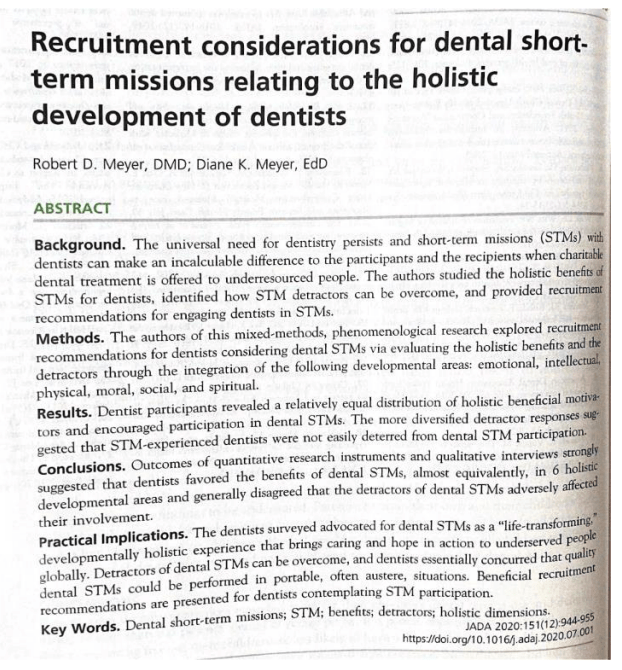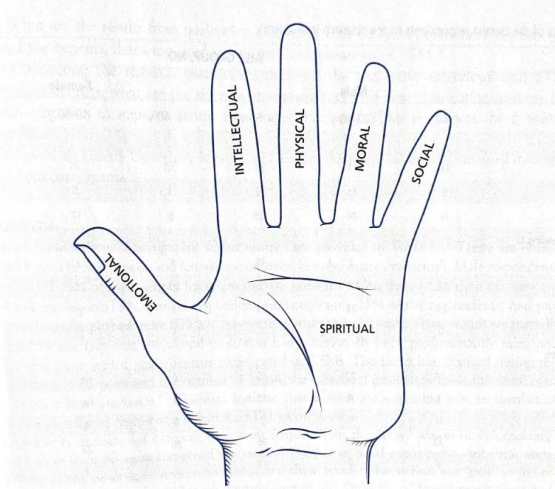There was an interesting article in the December 2020 issue of the Journal of the American Dental Association on a subject near and dear to my heart. It is interesting to me that this article was published in this particular journal because it has to do with dental mission work. Let me walk you through it. First the reason this is an important topic is because there is a universal need for dentistry and dental pain and infections are a great source of problems for underserved populations both here in the United
States as well as in other countries.
For this reason, there is a need for what we can call basic dental care.
Sometimes, if we can bring with us to a mission location – not a dental office — the right supplies and equipment, tooth decay can be treated with modern high-quality fillings. Once I saw the coordination of two mission trips spaced a few weeks apart that enabled the delivery of dentures and partial dentures on the mission field.
But there is a level of mission care even more basic than this. It requires less equipment but is still quite valuable. When we do not have access to electricity or generators, there is still a way of providing suffering people with extractions and cleanings using local anesthesia and basic instruments. These still go a long way in reducing infections and eliminating pain.
This subject of short-term mission work needs volunteer dentists and the purpose of the article was to study dentist attitudes about doing this type of work.
The design of the research was to use a combination of questions that could be tabulated numerically sent to dentists via email – as well as accomplishing some face-to-face interviews in order to better
understand motivations.
2000 research questionnaires were sent out. The return rate was 20%. This resulted in 395 respondents from 44 US states.
After the questionnaires were returned and their data placed into a spread sheet of some sort, they were compared against the data collected from 60 qualitative interviews of dentists experienced with this type of work and who had an average of 55 trips each.
Here is how they described what they did in the article:
“In constructing the research instrument and in conducting the qualitative interviews, we performed a thorough literature search exceeding 250 STM (short term mission) resources, consultation with hundreds of dentists at more than 330 dental convention exhibit booths during the past 5 years, and personal experiences from more than 70 STMs. Using these sources, we gleaned and categorized major benefits and detractors of STMs into six holistic, developmental areas.”
So let me jump to the bottom line of the study. Those who participated in this sort of work found it benefited them in the following six areas of life – they make up the holistic picture of who we are as people: Emotional, Intellectual, Physical, Moral, Social and Spiritual.
Often these are associated with the picture of the hand. Each finger represents one of these areas with the palm of the hand assigned to the Spiritual Center. I will have a picture of this that I took from the
article posted in the Blog Section of my website – dryoungperiodontics.com.
Those who sent back the questionnaires responding negatively to the idea of short-term volunteer activities were then evaluated for the reasons someone might not want to participate. These resistant
points were then discussed in the interviews with those most knowledgeable about this type of work and the conclusion was that detractors did not adversely affect short-term mission movement.
So, now let me put all of this in my own words, speaking personally.
When we are able to treat patients in a mission-setting, it benefits the patients, certainly. That is the primary reason for the activity. But there is something else that happens – a benefit, often unexpected, especially at first, in its power to affect those who volunteer. And as the article nicely broke this down, it affects those of us who do this sort of work in those six areas of life. Let me go down them for myself.
First Emotional. It is important to maintain an emotional connection to people who suffer – however, it isn’t easy when there is physical pain and emotional fear involved. Also, there is the feeling of helplessness in the face of problems beyond our control to fix. In other words, it is understood that no matter what the amount of care provided there is still more to be done. The problem will never be completely solved in this sense. For this reason it is very understandable that people would prefer not to step into situations so far out of their ability to control and for that reason avoid volunteering.
There are studies that show that those entering dental school have I aspirations of serving humanity.
This is what we all say in interviews when applying to all sorts of post graduate training. But this is not to say it isn’t sincere.
After dental school the same individuals when given the same psychological tests are consistently found to have hardened and become more cynical about life, themselves and others. This happened to me.
The reason has to do with beginning in our imaginations as to how life will be and then actually going through and experiencing it in real life. No one fortunately can anticipate how difficult some of the training is to our self-esteem and our relationships with others. Dental students are placed under a great deal of stress. Some of it is unique but some of it is commonly shared by others going through the education process toward careers they hope to have upon graduation. Most dental students today are under enormous debt pressure. All of this results in a great deal of inward turmoil.
Fortunately for me, while still in dental school, I was permitted to go with a dental school instructor on a dental mission trip to southern Mexico. It involved transportation to small villages via light plan. We hauled portable dental chairs made of cardboard along with generators and compressors in order to actually accomplish dental fillings.
This singular experience had a profound affect on my attitudes. It did a number to my emotions. It reduced my self-centered focus and provided me a different context in which to care for patients, work with other team mates and the rest. It also set me on a course for wanting to continue this type of activity through my career – not to solve the world’s problems, but to help stabilize my own selfish, self- centered nature. In many ways I think, the volunteer work, has greatly enhanced my professional skills and work that I provide people every day. I hope I am making sense to you. If you volunteer, no matter what it is – as long as it is not a reciprocal interaction – in other words – whoever you care for does not owe you anything in return, then good things will happen to you that are beyond our ability to
comprehend. They will be changes within the heart that are actually priceless in nature and of an immense therapeutic value. Giving care to others freely obviously does not pay the bills. In fact, in a financial sense it costs those who give it. The difference is, that instead of taking money from someone else in order to go and care for others (which is a legitimate way of doing things for those who dedicate themselves to long-term missions), I will utilize my own resources – essentially pay for myself to go.
Intellectual benefits.
A great deal of planning is necessary when we become involved in these short-term mission activities. In addition, the planning involves coordinating with others if it is a team project. The first hour of set-up in
a small church with one electrical outlet for example challenges the mind. How will we manage crowd control? How will me make sure we treat everyone who comes fairly? How will we work with those from
the local community who have come to help us? And the list goes on.
There has not been a volunteer event I have participated in that I have not learned many practical things that I can then incorporate in my daily practice. The point is, we learn from difficult challenges and what
we learn has the possibility of staying with us and changing how we do things in the future.
Physical – What can I say? It’s an adventure. You get out of your routine and go places and do things.
And in the process you get to help haul equipment.
Moral – This is an important area to consider. It has to do with the dignity of man. Just because we go to provide care to those who cannot afford it, does not give us license to misuse anyone. This environment enables mores seasoned dentists to work with dental students and others about how to care for others with dignity and respect.
Social – This is an amazing opportunity to work and interact with others. Great and lasting friendships are made on mission activities like this.
Spiritual – All of this feeds our spiritual centers and I believes helps us hear and see God work in the world. I’ll leave it there.
If you would like to learn more about opportunities to service in this area – and I’m not just talking to dentists here, then drop me a line and let me know. I can help you connect with Christian Medical and
Dental Associations Directors here in San Antonio. But of course, you can find outlets through churches and other programs that may be nearer to where you are.
Thanks for listening. This has been the Perio Patient Podcast, The Perio Hygienist Podcast – the first one in 2021. My name is Dr. Ben Young. I am a periodontist in private practice here in San Antonio Texas.
Thanks for listening.



